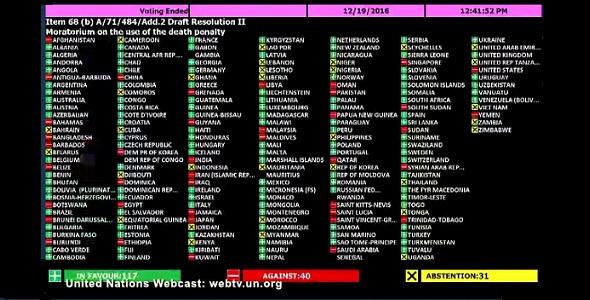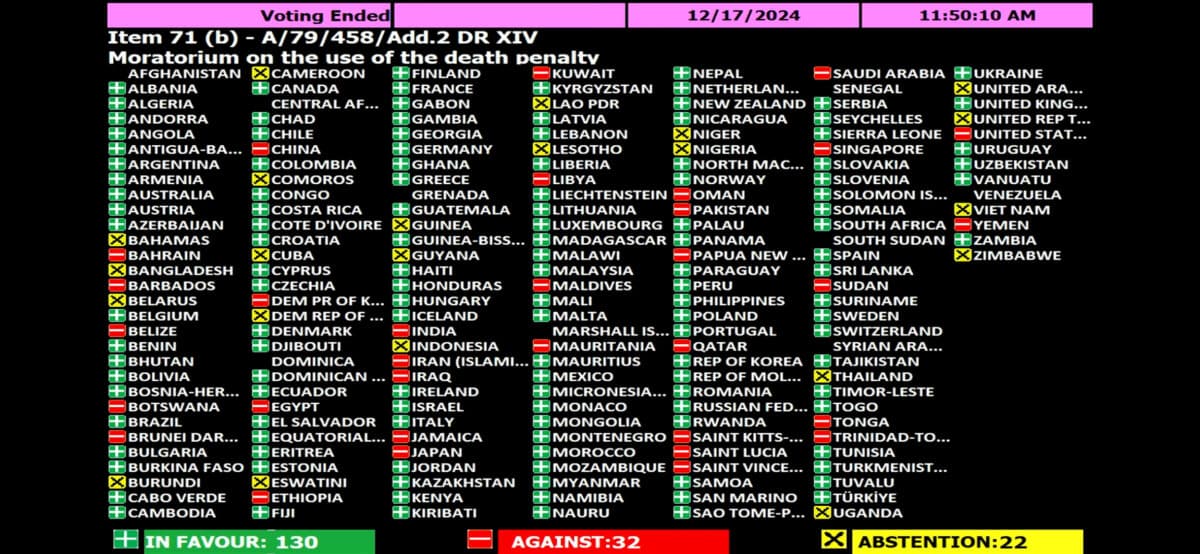
The UN General Assembly voted overwhelmingly for a 6th resolution calling for a universal moratorium on executions
Confirming the vote of the UNGA’s Third Committee on 17 November, the resolution A/RES/71/187 was adopted by a large majority, with news States voting in favour of it. 117 voted for the resolution, 40 against (+ 2 compared to 2014) while 31 abstained (- 3) and 5 were absent. 89 States cosponsored the resolution.
The adoption of this resolution confirms and supports the global trend towards the abolition of the death penalty.
A reflection of the actual death penalty situation worldwide
Following recent abolitions in law, Guinea and Nauru voted in favour of the resolution and Guinea co-sponsored it for the first time. Mongolia was one of the two lead co-sponsors and Fiji and Suriname confirmed their positive votes for the second time in a row.
Recent evolutions in abolitionist in practice countries also lead to a positive change of vote in Malawi and Swaziland which voted, for the first time, in favour of the resolution. Zimbabwe moved from opposition to abstention and Sri Lanka from abstention to a vote in favour, confirming its commitments taken during the 6th World Congress against the Death Penalty in June 2016. DRC which had taken a similar commitment during the World Congress was unfortunately absent from the vote.
National debates and political crises were also reflected in some of the weakening of support. Burundi and South Sudan moved from yes to no while Niger, Equatorial Guinea and Seychelles moved from a positive vote to abstention. The Philippines moved from a positive vote to abstention while the Maldives regrettably moved from abstention to a negative vote.
A smaller but very active group of hard core retentionist countries
While the number of countries opposed to the resolution went down from 54 in 2007 to 37 in 2014 and 40 in 2016, and the number of countries signing the statement of dissociation from 58 in 2008 to 27 in 2015, a small group of countries, led by Singapore have been really active in 2016. For the first time, they managed to have an amendment to the text on state sovereignty, introduced by Singapore, adopted on the edge by 76 States, while 72 voted against during the 3rd Committee. It is very interesting to note, however, that the amendment had no repercussion whatsoever on the vote.
The resolution unequivocally frames the death penalty as a human rights issue, calling on States to “establish a moratorium on executions with a view to abolishing the death penalty”. As Singapore said during the debate, “the focus (…) had, over the years, shifted from being a moratorium to a push for abolishing the practice”. The text also calls upon States to ratify the Second Optional Protocol to the International Covenant on Civil and Political Rights, aiming at the abolition of the death penalty.
The 2016 resolution has also introduced new elements to make the text stronger in encouraging all States to take further steps towards respecting international law and reducing the application of the death penalty. Paragraph 6(f) thus calls upon States to “ensure that those facing the death penalty can exercise their right to apply for pardon or commutation of their death sentence” along fair and transparent procedures. To increase the transparency, the UNGA also called upon the States to disaggregate the information on the use of the death penalty by sex, age and race (Paragraph 6(c)).







